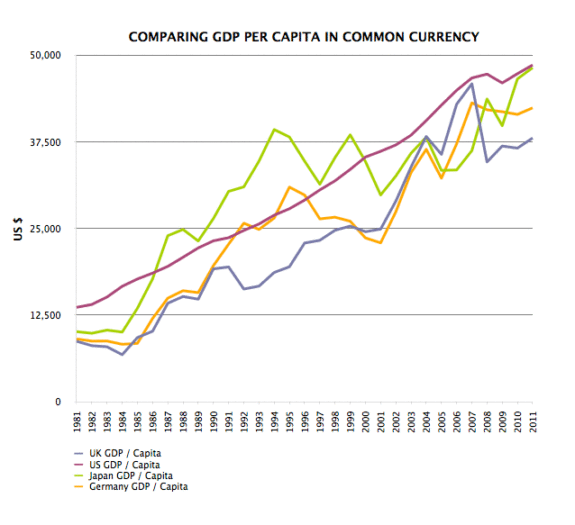Warren Buffet visited Japan for the first time in November. At the press conference journalists blinked in disbelief at his breezy assertion that their grandchildren would enjoy better lives than they themselves had.
The conventional wisdom, at home and overseas, is that Japan is a basket case. With the Topix Index hovering at 1984 levels, the idea of a “triumph of the optimists” – meaning the success of investment in equities, and thus growth and a better future – sounds positively delusional. The first cohort of bear market graduates are now in their mid-forties. Deflation, debt and decline are ingrained into their expectations.
Yet is the gloom really justified?
Check out the chart above for an alternative view of Japanese economic reality. It compares GDP per capita for four countries, the US, the UK, Germany and Japan, over the past thirty years. The wrinkle is that GDP is expressed in nominal terms and in common currency (US$, for the sake of convenience).
On this analysis Japan is doing fine. In fact it has made ground relative to other major developed countries, even after two “lost decades” – in reality one lost decade and one of solid if unspectacular performance.
The standard way of comparing economic performance is by growth in GDP expressed in local currencies. Most of the time this is fair enough, but it has two disadvantages.
First, it ignores the effect of population growth, which in the developed world comes mostly from immigration. In the US and the UK population growth is nearly 1% p.a. whereas the Japanese population is declining at about 0.3%. So the US & UK need their economic growth to be 1.3% higher than Japan’s just to keep living standards constant.
Second, it ignores big shifts in exchange rates, like those that have occurred in the wake of the global financial crisis. In sterling terms, there has been little change in British house prices or the wages of British workers. But in yen terms – or relative to the price of gold or Indian stocks or a barrel of oil – those prices have already crashed. The result of this stealth impoverishment is that foreigners can easily outbid the locals for London prime property and places at elite British schools.
Japan’s hard currency / deflationary policy settings have had some malign consequences. Export competitiveness has been lost to Korea and other Asian countries. Aged, risk averse savers have benefited at the expense of entrepreneurs and young workers. Tourists stay away.
But how stuffed can you really be if your currency is viewed by world markets as a safe haven and your government can raise ten year money at an interest rate of 1%?
Will the rest of the developed world cope with “turning Japanese” as well as Japan has?
